Unit 12 Life is full of the unexpected SectionA课件
文档属性
| 名称 | Unit 12 Life is full of the unexpected SectionA课件 |  | |
| 格式 | zip | ||
| 文件大小 | 6.2MB | ||
| 资源类型 | 教案 | ||
| 版本资源 | 人教新目标(Go for it)版 | ||
| 科目 | 英语 | ||
| 更新时间 | 2018-07-13 07:49:44 | ||
图片预览

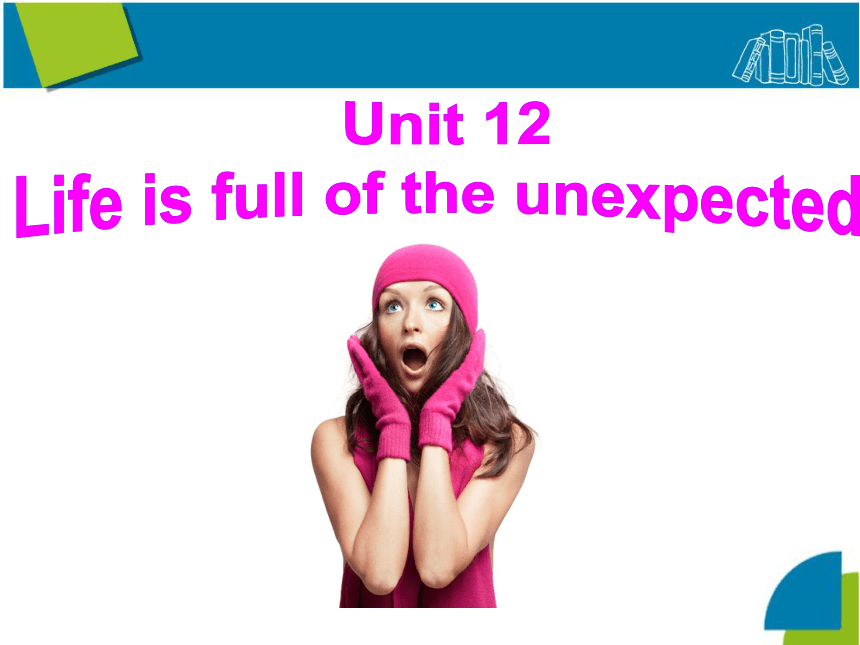
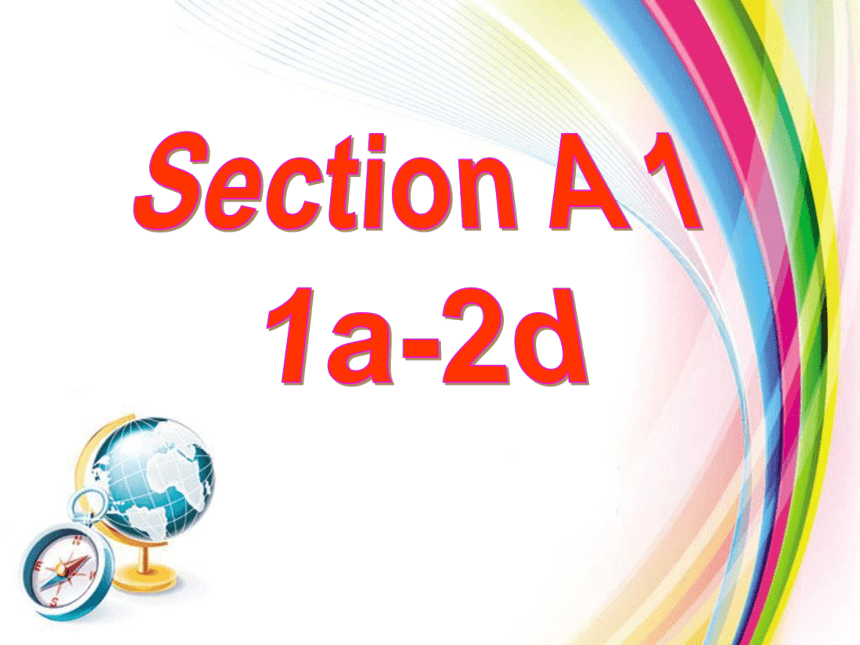

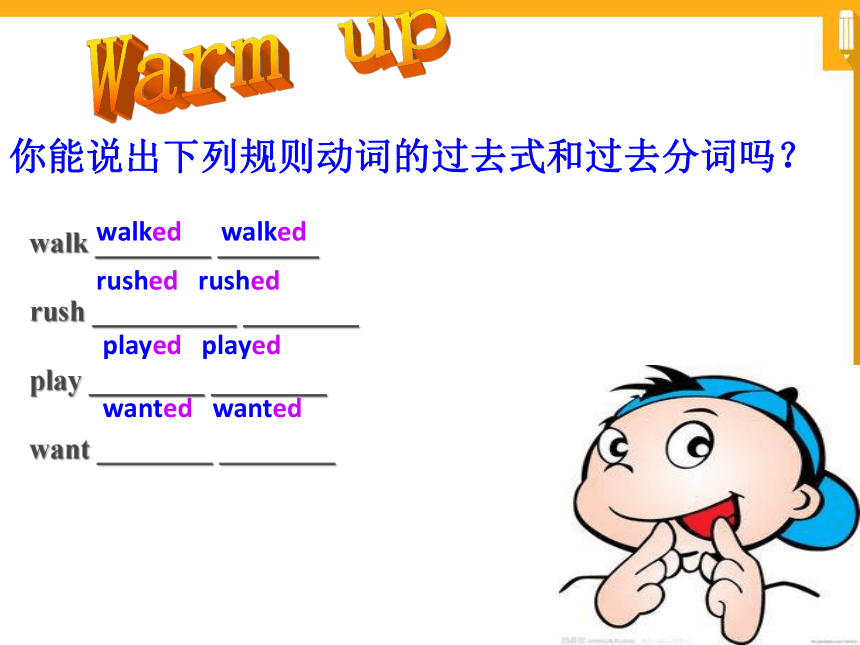
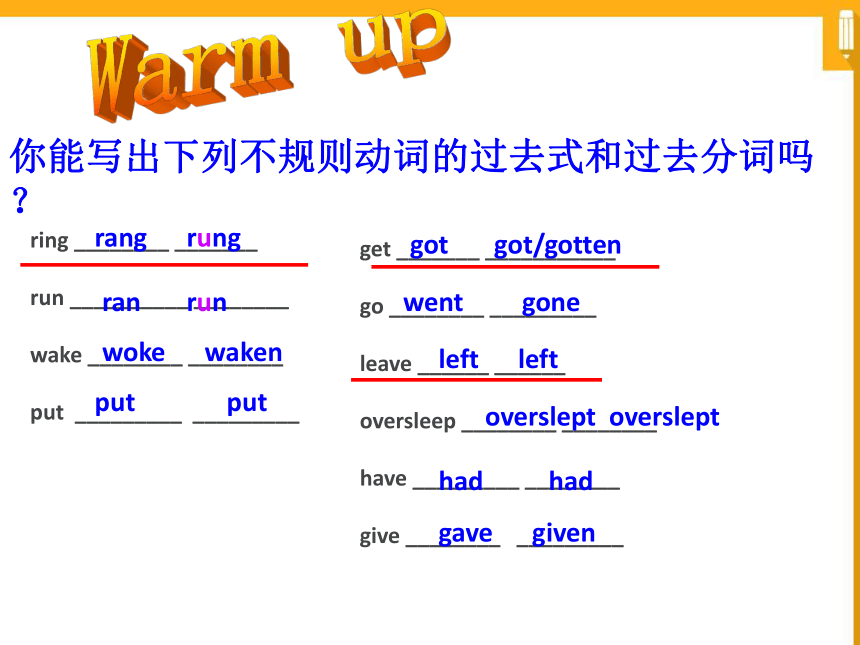

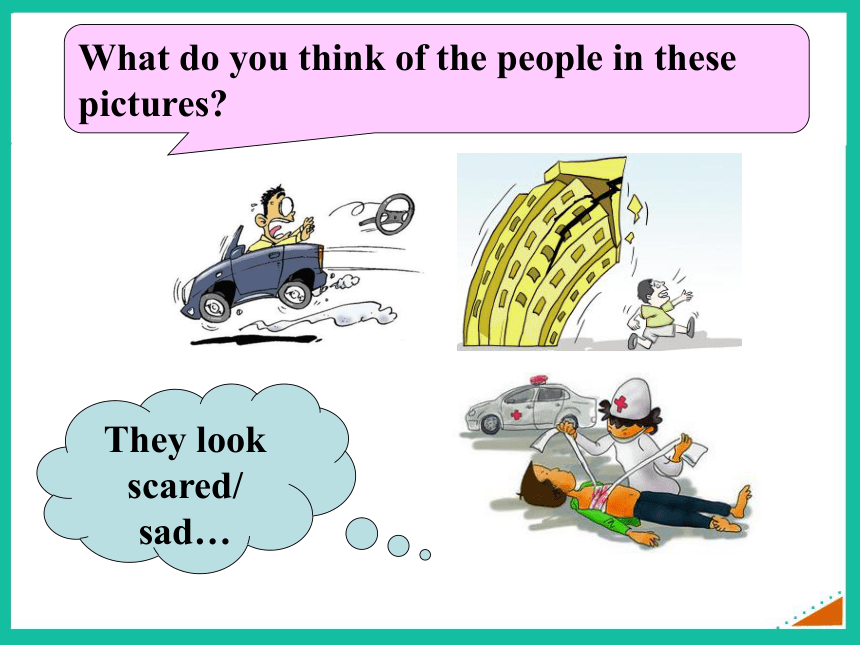
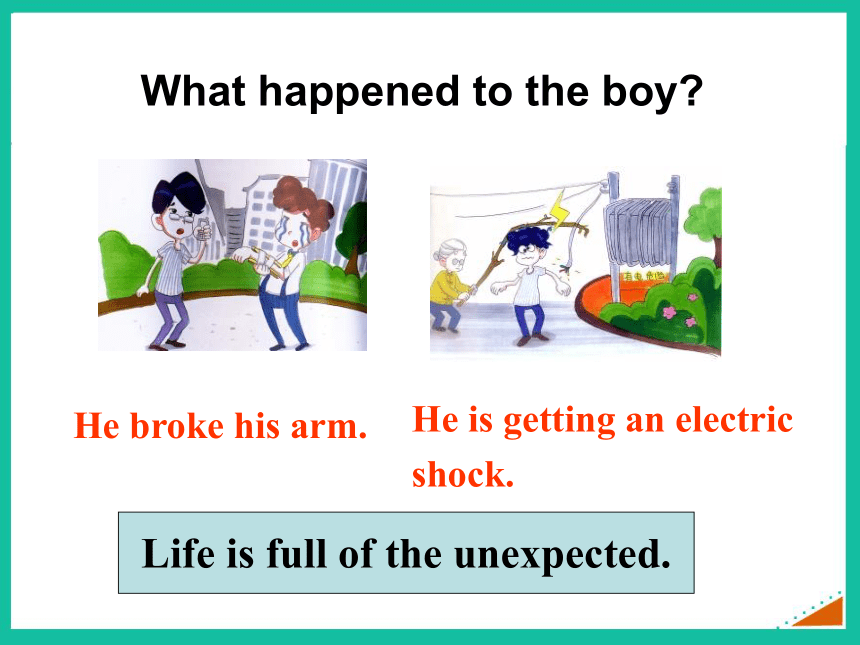

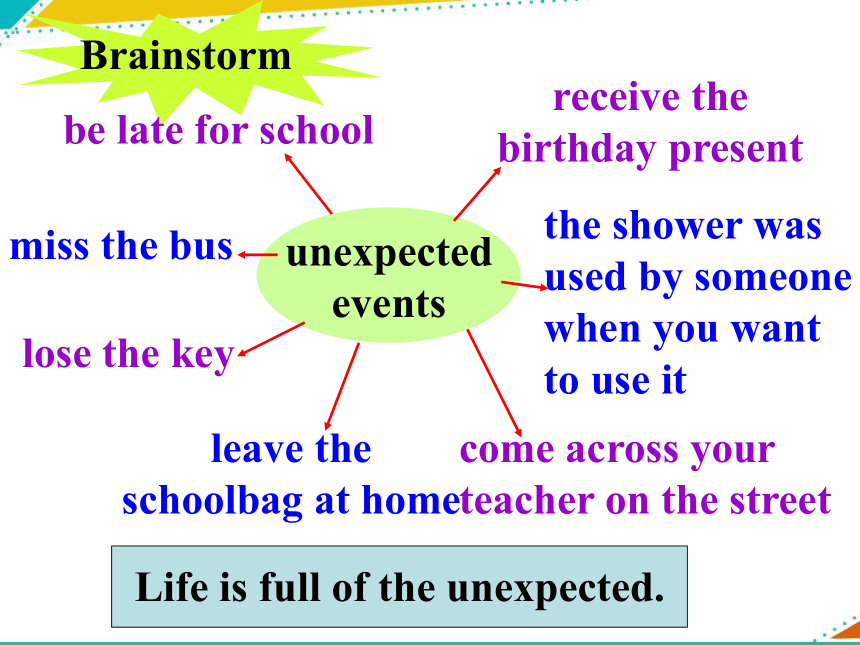

文档简介
课件77张PPT。Unit 12Unit 12
Life is full of the unexpected.Section A 1
1a-2dunexpected
by the time...
backpack
oversleep
ring
give...a liftadj. 出乎意料的;始料不及的
在......以前
n. 背包;旅行包
v. 睡过头;睡得太久
v. (钟、铃等)鸣;响
捎......一程你能说出下列规则动词的过去式和过去分词吗?
walk ________ _______
rush __________ ________
play ________ ________
want ________ ________
Warm upwalked walkedrushed rushedplayed playedwanted wantedget _______ ___________
go ________ _________
leave ______ ______
oversleep ________ ________
have _________ ________
give ________ _________你能写出下列不规则动词的过去式和过去分词吗?
ring ________ _______
run __________ ________
wake ________ ________
put _________ _________Warm uprang rungran runwoke wakengot got/gottenwent goneleft leftoverslept overslepthad hadput putgave givenWarming upDo you remember any unexpected situation in your daily life?What do you think of the people in these pictures? They look scared/ sad…He broke his arm.He is getting an electric shock.What happened to the boy?Life is full of the unexpected.I was late for work today. When I got up, I found my clock had rung. It was 7:30. When I went out, I found the bus had already left. Brainstorm
unexpected
eventsbe late for schoolmiss the buslose the keyleave the schoolbag at homereceive the birthday present come across your teacher on the streetthe shower was used by someone when you want to use itLife is full of the unexpected.1aLook at the pictures. What happened to the girl?She got up late. She overslept.Tell a storyoversleep (overslept, overslept)
v. 睡过头;睡得太久
复合词中的over常有“过于……”之意
Don’t oversleep, Dean! You are to be late.
迪恩,别睡过头了!你要迟到了。What happened to her?Mary had a bad morning.Tina had a terrible morning.What happened to her?By the time she got up, her brother had already gotten in the shower. get ---got ---gotten when wait for him to go outTina had a terrible morning.What happened to her?The bus left.By the time she got outside, the bus had already left.She missed the early bus. =didn’t catch caught / caught leave
left
leftTina had a terrible morning.What happened to her?She had to rush to the school. = run as quickly as someone can run --- ran ---runTina had a terrible morning.What happened to her?She left her backpack at home.When she got to school, she realized that
she had left her backpack at home.1. By the time I got up, my brother _____ already _______ in the shower.
2. By the time I got outside, the bus _____ already ______.
3. When I got to school, I realized I _____ ______ my backpack at home.1bListen to Mary talking about her morning. Complete the sentences.hadgottenhadlefthadleftMary’s bad morning overslept By the time ---had gotten in the shower had left rushed torealized ---had left What a pain!
真糟糕! Mary o________(oversleep) yesterday. By the time she g____ up, her brother _____ already _____ (get) in the shower. And by the time she ____ (get) outside, the bus ____ already ____ (leave). So she had to run to school. When she got to school, she _______ (realize)she __________(leave) her backpack at home. versleptothadgotten got lefthadrealizedhad leftMary’s bad morningPractice1cTake turns being Mary. Look at the pictures and talk about what happened this morning. I overslept. By the time I got up, my brother had already gotten in the shower.What happened?So, after he out of the shower, I took a quick shower and got dressed. But by the time I went outside, the bus had already left.Oh, what a pain!Oh, yes! So I ran all the way to school. But when I got to school, I realized I had left my backpack at home. Oh, no!No wonder you look stressed.通过训练,你来总结一下:
(1)By the time I got up, my brother had already gotten
in the shower.
By the time I got outside, the bus had already left.
When I got to the school, I realized I had left my
backpack at home.
这三句话是什么时态的句子?_____________
(2)过去完成时表示在过去某个时间,或动作之前
已经发生或完成的动作。即“__________”。
结构为:_________
3)by the time 意思是 __________, = when, 后接过去时的句子时, 主语的谓语动词用____________。
观察与思考:过去的过去过去完成时had +过去分词在 … 时候过去式3. 到昨晚上,他已写完那封信。By yesterday evening he ___________ (write) that letter.4. 他说他以前见过你。He said that he ____________(see) you before.5. 当我进来时,他已做完了作业。When I came in, he ________________(finish) his homework.had writtenhad seenhad finished1. 她到家之前她的孩子已经睡着了。When she got home, her children ____________(sleep).2. 在他们到达之前电影已经开始了。Before they arrived here, the film _________ already ___________ (start).had slepthadstartedLanguage pointsLife is full of the unexpected. 生活充满了意外。
the unexpected 为名词化的形容词,意为
“出乎意料的事”。 英语中,有些形容词与定冠词the连用,表示一类人或事物,在句子中起名词的作用。
例:the homeless (无家可归者)
the disabled(残疾人)
the unwanted( 无人认领物品)2. When I got to school, I realized I ______
______ my backpack at home. 当我到学校时我意识到我把书包忘在家里了。
表示“把某物忘在某处”要用词组leave sth. +地点。forget意为“遗忘某物”,指忘记一件具体的东西,但不能有具体的地点。
例:I?left?my?book?on?the?desk.?
我把书忘在了桌子上。
I?forgot?my?umbrella?yesterday?.
我昨天忘了带伞。Exercises用方框内短语的适当形式填空。1. Tom __________, running after his brother in the dark night yesterday.
2. __________ I was 10, I had been able to either play piano or violin.
3. _________, Sammy! It has been late for you to go to school. rushed outBy the timeWake up ? by the time, wake up, rush out根据句意和汉语提示,填写单词。1. There will be an __________ (意外的) surprise.
2. The children _________ (冲,奔) out of the school when the bell rang.
3. Yesterday the girl ________ (违反) the rule and her teacher was angry.
4. When I was about to read my book, I found I ________ (忘了带) it at home.unexpectedrushedbrokehad leftTHANK YOU!Section A 1
2a-2d你能说出下列规则动词的过去式和过去分词吗?
walk ________ _______
rush __________ ________
play ________ ________
want ________ ________
Warm upwalked walkedrushed rushedplayed playedwanted wantedget _______ ___________
go ________ _________
leave ______ ______
oversleep ________ ________
have _________ ________
give ________ _________你能写出下列不规则动词的过去式和过去分词吗?
ring ________ _______
run __________ ________
wake ________ ________
put _________ _________Warm uprang rungran runwoke wakengot got/gottenwent goneleft leftoverslept overslepthad hadput putgave given2aListen to Mary continue her story. Number the pictures [1-4] in the correct order.43122bFill in the blanks with the correct forms of the verbs in brackets. Then listen again and check your answers.1. When I _______ (get) home, I realized I ________ (leave) my keys in the backpack.
2. By the time I _____ (get) back to school, the bell _________ (ring).
3. By the time I _______ (walk) into class, the teacher __________ (start) teaching already.gothad leftgothad rungwalkedhad started2cMake up an ending for the story and share it with your partner. The teacher looked at Mary and asked her if she had finished the homework. Mary told her the unexpected things she met with this morning but they sound like excuses to the teacher. Therefore, Mary was asked to finish the homework in the class. What an unforgettable day it is for Mary!Role-play the conversation.Matt: Why were you late for class today,
Kevin?
Kevin: My alarm clock didn’t go off! I kept
sleeping, and when I woke up it was
already 8:00 a.m.!
Matt: Oh, no!
Kevin: So I just quickly put on some clothes
and rushed out the door.
Matt: You didn’t eat breakfast?2d冲出Kevin: No, I didn’t even brush my teeth or
wash my face! But before I got to
the bus stop, the bus had already left.
Matt: Then how did you get here?
Kevin: Luckily, Carl’s dad saw me on the
street and gave me a lift in his car.
Matt: Well, at least by the
time you got to school,
you were only five
minutes late for class.捎……一程1. Why was Kevin late for class?
2. How did Kevin get to school? His clock didn’t go off. He overslept. Carl’s dad saw him on the street and gave him a lift in his car.Answer the questionsLanguage points1. My?alarm?clock?didn’t?go?off!?我的闹钟没响。
? go?off?意为“发出响声”。?
例:Something?was?wrong?with?my?alarm?
clock?and?it?didn’t?go?off.?
我的闹钟出毛病了,它没有响。⑴?go?by?意为“(时间)过去;消逝”。?
例:Time?goes?by?second?by?second.?
时间一秒秒地消逝。?
⑵?go?on?意为“继续”。?
例:Please?go?on?working.?
请继续工作。2. So I just quickly put on some clothes and rushed out the door.
rush out 冲出去,冲出……
e.g. Henry rushed out the room and disappeared in the rain.
亨利冲出房间,消失在了雨中。
Julia rushed out and didn’t return.
朱丽叶冲了出去,再没回来。3.?Carl’s?dad?saw?me?on?the?street?and?gave?me?a?lift?in?his?car.?
Carl的爸爸在街上看到我, 捎了我一程。
?give?sb.?a?lift?是动词短语,意为“捎某人一程”,
相当于give?sb.?a?ride?/?give?a?ride?to?sb.??
例:I’m?a?little?late,?can?you?give?me?a?lift,?dad??
我要迟到了,你能捎我一程吗,爸爸?
练习题一、单项选择1.--Why?were?you?late?this?morning???
--My?alarm?clock?didn’t?_____,?so?I?overslept.?
?? A.?go?by??? ?B.?go?on????
C.?go?off??? ?D. go?down
2. When?I?got?to?the?cinema,?the?movie?____?for?
five?minutes.??
A.?began??? B.?had?begun??
C.?had?been?on D.?has?been?on??CC3.?She?will?be?a?nurse?____?she?graduates?from?the?school.???
A.?by?the?time? ? B.?at?this?time??
C.?at?that?time?? D.?at?a?time
4. I?___?this?morning?and?missed?the?early
bus.??
? A.?overslept?? B.?slept???
C.?held??? D.?caught?AA二、根据汉语意思完成句子。1. 当我到车站时,火车已经开走了。
??____?____?____?I?got?to?the?station,?the?
train?____?________?left.??
2. 长大后,他会离开这儿。???
He?_____?_____?here?by?the?time?he?______?up.
3. 他捎我去车站。
He?_____?____?____?____?to?the?station.?By the timehad alreadywill leavegrowsgave me a lift By the time4. 有时,坏事可以变成好事。???
A?bad?thing?can?be?______?_____?a?good?
one?sometimes.
5. 你知道飞机什么时间起飞吗????
Do?you?know?when?the?plane?will?______
______????
6.?房间里全是学生。???
The?room?_____?_____?_____?students.turned intotakeoff is full ofTHANK YOU!Section A 3
3a-3cblock
in line with
worker
stare
disbelief
above
burn
burnt; burnedn. 街区
(与……)成一排
n. 工作者;工人
v. 盯着看;凝视
n. 不信;怀疑
prep. 在……上面
adv. 在上面
v. 着火;燃烧burning
alive
airport
till
west
adj. 着火的;燃烧的
adj. 活着;有生气的
n. 机场
prep. &conj. 到;直到
adv. 向西;朝西
adj. 向西的;西部的
n. 西;西方What do you know about these pictures?“9·11事件”又称“911恐怖袭击事件”、“美国911事件”等,指的是美国东部时间2001年9月11日上午(北京时间9月11日晚上)恐怖分子劫持的4架民航客机撞击美国纽约世界贸易中心和华盛顿五角大楼的历史事件。包括美国纽约地标性建筑世界贸易中心双塔在内的6座建筑被完全摧毁,其它23座高层建筑遭到破坏,美国国防部总部所在地五角大楼也遭到袭击。 911事件How about these pictures?2·22新西兰克莱斯特彻奇地震 2011年2月22日中午12时51分,新西兰第二大城市克莱斯特彻奇发生里氏6.3级强烈地震,震源深度距离地表仅有4公里。新西兰警方表示,地震共造成182人遇难,成为新西兰80年来死伤最为惨重的地震。 3aRead the passage and answer the questions.1. Which two events does the writer mention?The writer mentions the September
11 attack in New York and the
earthquake in New Zealand.2. How did the writer end up missing both events?The writer went to get a coffee first and was not in the office when the plane hit the World Trade Center. He/she had overslept and missed his/her flight, so he/she was able to avoid the earthquake. ◆ 快速阅读全文, 注意描述事件的关键词或短语,有助于整篇文章的理解。
◆ 这些关键词可能是动词或动词短语,可能是介词短语,形容词,或连词等。 阅读指导◆ 第一段: found a job, arrived at, was about to, even though, stared, in disbelief, the burning building alive
◆ 第二段: woke up, went off, had taken off, till, unexpectedly, turned into 1. lost:
2. west:
3. below:
4. dead:
5. empty:3bFind the opposite meanings to the words.foundeastabovealivefulladv. 向西,朝西
adj.向西的,西部的
n.西,西方1. I found the money on the floor.
2. The sun rises in the east.
3. There was a large bird flying above us.
4. His family was so happy to hear he was still alive.
5. The train was so full that I couldn’t get on the train at all.Write a sentence with each word. SummaryThe World
Trade Center
was hit by
a planeSeptember
11,2001In New
YorkHe decided to get a
coffee first from a
coffee place two
blocks away.EarthquakeFebruary
22,2011In New
ZealandHe missed his plane
to New Zealand.1. I was about to go up when I decided to get a coffee first.
be about to 忙于;即将做某事。侧重于表示动作马上就要发生,常与when引导的从句连用,但不与具体的时间状语连用。
e.g. One of my friends is about to have
her second baby. 我的一个朋友马
上就要生第二个小孩了。2. I went to my favorite coffee place even though it was two blocks east from my office.
even though 即使, 虽然, 尽管, 用于引导让步状语从句。
block n. 街区
e.g. He’s the best teacher, even though he
has the least experience.
他虽然经验最少,却是最好的老师。3. We stared in disbelief at the black smoke rising above the burning building.
stare v. 盯着看, 凝视
表示看得比较仔细,有时候也带有吃惊的意味去看,常与at, into连用。
e.g. Don’t stare at me like that.
别那样盯着我看。in disbelief 不相信 ,疑惑, 怀疑
e.g. Tamara stared at him in disbelief, shaking her head.
塔玛拉一边狐疑地盯着他看,一边摇着头。
She looked at him in disbelief.
她全然不信地看着他。above
prep.
1)(表示位置)在…正上方;高于”(与 below相对)。
e.g. That big high-rise above us is where
Brian lives.
我们上面的那座摩天大楼就是布赖
恩住的地方。
He lifted his hands above his head.
他将双手举过头顶。2) 表示在地位、级别、能力、资历、重要性等方面“超过”、“在……之上”、“比……强”。
e.g. He is above the others in ability.
他的能力优于其他人。
He is above me in every way.
他各个方面都比我强。above,on,?over的用法?aboveoverona.?above的意思是“在…之上;高于……”,表
示相对高度,不一定是在正上方,它的反
义词是below.?
?例:The?plane?flew?above?the?clouds.
飞机在云层上面飞行。??
b.?over的意思是“在…之上”,表示在垂直之
上,其反义词是under.?
?例:There?is?a?bridge?over?the?river.?
河上有座桥。??????
c. on的意思是“在…上面”,表示与表面接触。例:He?put?the?book?on?the?desk.
他把书放在课桌上。4. I felt lucky to be alive.
alive 一般作表语;也可以作后置定语或宾补。 “活(着)的;在世的;(继续)存在的”;反义词是dead。
e.g. Do you know she’s alive?
你知道她还活着吗?
People alive should try their best to
live better. (后置定语)
活下来的人应该尽力生活得更好。
Tom was kept alive in the big fire.
( 宾补) 汤姆在这次大火中活下来了。辨析 alive, living, lively
alive “活着的”,在句中常作表语或定语。作表语时,常可与?living互换;作定语时,常要放在被修饰词之后。
living“活着的”,在句中用作表语或定语。
lively“活泼的”,在句中可作表语或定语。5. But by the time I got to the airport, my plane to New Zealand had already taken off.
airport n. 机场
take off 脱掉; 起飞
e.g. He took off his hat and bowed as he
passed. 他经过时脱帽鞠躬。
We eventually took off at 11 o’clock
and arrived in Venice at 1:30.
我们终于在11点起飞,1:30 到达威
尼斯。Complete the sentences.
1. 我在动物园里见过活鳄鱼。
I have seen a _____?crocodile in the zoo.
2. 他是那场火灾中唯一活下来的人。
He is the only person ____?in the fire.
3. 露西是个活泼的孩子,大家都喜欢她。
Lucy is a _____?child and everyone likes her.living?alivelively4. The boy ____________________ (正要开始) but someone spoke first.
5. Hurry up. The train ______________ (马上就要开了).was just about to beginis about to start
Life is full of the unexpected.Section A 1
1a-2dunexpected
by the time...
backpack
oversleep
ring
give...a liftadj. 出乎意料的;始料不及的
在......以前
n. 背包;旅行包
v. 睡过头;睡得太久
v. (钟、铃等)鸣;响
捎......一程你能说出下列规则动词的过去式和过去分词吗?
walk ________ _______
rush __________ ________
play ________ ________
want ________ ________
Warm upwalked walkedrushed rushedplayed playedwanted wantedget _______ ___________
go ________ _________
leave ______ ______
oversleep ________ ________
have _________ ________
give ________ _________你能写出下列不规则动词的过去式和过去分词吗?
ring ________ _______
run __________ ________
wake ________ ________
put _________ _________Warm uprang rungran runwoke wakengot got/gottenwent goneleft leftoverslept overslepthad hadput putgave givenWarming upDo you remember any unexpected situation in your daily life?What do you think of the people in these pictures? They look scared/ sad…He broke his arm.He is getting an electric shock.What happened to the boy?Life is full of the unexpected.I was late for work today. When I got up, I found my clock had rung. It was 7:30. When I went out, I found the bus had already left. Brainstorm
unexpected
eventsbe late for schoolmiss the buslose the keyleave the schoolbag at homereceive the birthday present come across your teacher on the streetthe shower was used by someone when you want to use itLife is full of the unexpected.1aLook at the pictures. What happened to the girl?She got up late. She overslept.Tell a storyoversleep (overslept, overslept)
v. 睡过头;睡得太久
复合词中的over常有“过于……”之意
Don’t oversleep, Dean! You are to be late.
迪恩,别睡过头了!你要迟到了。What happened to her?Mary had a bad morning.Tina had a terrible morning.What happened to her?By the time she got up, her brother had already gotten in the shower. get ---got ---gotten when wait for him to go outTina had a terrible morning.What happened to her?The bus left.By the time she got outside, the bus had already left.She missed the early bus. =didn’t catch caught / caught leave
left
leftTina had a terrible morning.What happened to her?She had to rush to the school. = run as quickly as someone can run --- ran ---runTina had a terrible morning.What happened to her?She left her backpack at home.When she got to school, she realized that
she had left her backpack at home.1. By the time I got up, my brother _____ already _______ in the shower.
2. By the time I got outside, the bus _____ already ______.
3. When I got to school, I realized I _____ ______ my backpack at home.1bListen to Mary talking about her morning. Complete the sentences.hadgottenhadlefthadleftMary’s bad morning overslept By the time ---had gotten in the shower had left rushed torealized ---had left What a pain!
真糟糕! Mary o________(oversleep) yesterday. By the time she g____ up, her brother _____ already _____ (get) in the shower. And by the time she ____ (get) outside, the bus ____ already ____ (leave). So she had to run to school. When she got to school, she _______ (realize)she __________(leave) her backpack at home. versleptothadgotten got lefthadrealizedhad leftMary’s bad morningPractice1cTake turns being Mary. Look at the pictures and talk about what happened this morning. I overslept. By the time I got up, my brother had already gotten in the shower.What happened?So, after he out of the shower, I took a quick shower and got dressed. But by the time I went outside, the bus had already left.Oh, what a pain!Oh, yes! So I ran all the way to school. But when I got to school, I realized I had left my backpack at home. Oh, no!No wonder you look stressed.通过训练,你来总结一下:
(1)By the time I got up, my brother had already gotten
in the shower.
By the time I got outside, the bus had already left.
When I got to the school, I realized I had left my
backpack at home.
这三句话是什么时态的句子?_____________
(2)过去完成时表示在过去某个时间,或动作之前
已经发生或完成的动作。即“__________”。
结构为:_________
3)by the time 意思是 __________, = when, 后接过去时的句子时, 主语的谓语动词用____________。
观察与思考:过去的过去过去完成时had +过去分词在 … 时候过去式3. 到昨晚上,他已写完那封信。By yesterday evening he ___________ (write) that letter.4. 他说他以前见过你。He said that he ____________(see) you before.5. 当我进来时,他已做完了作业。When I came in, he ________________(finish) his homework.had writtenhad seenhad finished1. 她到家之前她的孩子已经睡着了。When she got home, her children ____________(sleep).2. 在他们到达之前电影已经开始了。Before they arrived here, the film _________ already ___________ (start).had slepthadstartedLanguage pointsLife is full of the unexpected. 生活充满了意外。
the unexpected 为名词化的形容词,意为
“出乎意料的事”。 英语中,有些形容词与定冠词the连用,表示一类人或事物,在句子中起名词的作用。
例:the homeless (无家可归者)
the disabled(残疾人)
the unwanted( 无人认领物品)2. When I got to school, I realized I ______
______ my backpack at home. 当我到学校时我意识到我把书包忘在家里了。
表示“把某物忘在某处”要用词组leave sth. +地点。forget意为“遗忘某物”,指忘记一件具体的东西,但不能有具体的地点。
例:I?left?my?book?on?the?desk.?
我把书忘在了桌子上。
I?forgot?my?umbrella?yesterday?.
我昨天忘了带伞。Exercises用方框内短语的适当形式填空。1. Tom __________, running after his brother in the dark night yesterday.
2. __________ I was 10, I had been able to either play piano or violin.
3. _________, Sammy! It has been late for you to go to school. rushed outBy the timeWake up ? by the time, wake up, rush out根据句意和汉语提示,填写单词。1. There will be an __________ (意外的) surprise.
2. The children _________ (冲,奔) out of the school when the bell rang.
3. Yesterday the girl ________ (违反) the rule and her teacher was angry.
4. When I was about to read my book, I found I ________ (忘了带) it at home.unexpectedrushedbrokehad leftTHANK YOU!Section A 1
2a-2d你能说出下列规则动词的过去式和过去分词吗?
walk ________ _______
rush __________ ________
play ________ ________
want ________ ________
Warm upwalked walkedrushed rushedplayed playedwanted wantedget _______ ___________
go ________ _________
leave ______ ______
oversleep ________ ________
have _________ ________
give ________ _________你能写出下列不规则动词的过去式和过去分词吗?
ring ________ _______
run __________ ________
wake ________ ________
put _________ _________Warm uprang rungran runwoke wakengot got/gottenwent goneleft leftoverslept overslepthad hadput putgave given2aListen to Mary continue her story. Number the pictures [1-4] in the correct order.43122bFill in the blanks with the correct forms of the verbs in brackets. Then listen again and check your answers.1. When I _______ (get) home, I realized I ________ (leave) my keys in the backpack.
2. By the time I _____ (get) back to school, the bell _________ (ring).
3. By the time I _______ (walk) into class, the teacher __________ (start) teaching already.gothad leftgothad rungwalkedhad started2cMake up an ending for the story and share it with your partner. The teacher looked at Mary and asked her if she had finished the homework. Mary told her the unexpected things she met with this morning but they sound like excuses to the teacher. Therefore, Mary was asked to finish the homework in the class. What an unforgettable day it is for Mary!Role-play the conversation.Matt: Why were you late for class today,
Kevin?
Kevin: My alarm clock didn’t go off! I kept
sleeping, and when I woke up it was
already 8:00 a.m.!
Matt: Oh, no!
Kevin: So I just quickly put on some clothes
and rushed out the door.
Matt: You didn’t eat breakfast?2d冲出Kevin: No, I didn’t even brush my teeth or
wash my face! But before I got to
the bus stop, the bus had already left.
Matt: Then how did you get here?
Kevin: Luckily, Carl’s dad saw me on the
street and gave me a lift in his car.
Matt: Well, at least by the
time you got to school,
you were only five
minutes late for class.捎……一程1. Why was Kevin late for class?
2. How did Kevin get to school? His clock didn’t go off. He overslept. Carl’s dad saw him on the street and gave him a lift in his car.Answer the questionsLanguage points1. My?alarm?clock?didn’t?go?off!?我的闹钟没响。
? go?off?意为“发出响声”。?
例:Something?was?wrong?with?my?alarm?
clock?and?it?didn’t?go?off.?
我的闹钟出毛病了,它没有响。⑴?go?by?意为“(时间)过去;消逝”。?
例:Time?goes?by?second?by?second.?
时间一秒秒地消逝。?
⑵?go?on?意为“继续”。?
例:Please?go?on?working.?
请继续工作。2. So I just quickly put on some clothes and rushed out the door.
rush out 冲出去,冲出……
e.g. Henry rushed out the room and disappeared in the rain.
亨利冲出房间,消失在了雨中。
Julia rushed out and didn’t return.
朱丽叶冲了出去,再没回来。3.?Carl’s?dad?saw?me?on?the?street?and?gave?me?a?lift?in?his?car.?
Carl的爸爸在街上看到我, 捎了我一程。
?give?sb.?a?lift?是动词短语,意为“捎某人一程”,
相当于give?sb.?a?ride?/?give?a?ride?to?sb.??
例:I’m?a?little?late,?can?you?give?me?a?lift,?dad??
我要迟到了,你能捎我一程吗,爸爸?
练习题一、单项选择1.--Why?were?you?late?this?morning???
--My?alarm?clock?didn’t?_____,?so?I?overslept.?
?? A.?go?by??? ?B.?go?on????
C.?go?off??? ?D. go?down
2. When?I?got?to?the?cinema,?the?movie?____?for?
five?minutes.??
A.?began??? B.?had?begun??
C.?had?been?on D.?has?been?on??CC3.?She?will?be?a?nurse?____?she?graduates?from?the?school.???
A.?by?the?time? ? B.?at?this?time??
C.?at?that?time?? D.?at?a?time
4. I?___?this?morning?and?missed?the?early
bus.??
? A.?overslept?? B.?slept???
C.?held??? D.?caught?AA二、根据汉语意思完成句子。1. 当我到车站时,火车已经开走了。
??____?____?____?I?got?to?the?station,?the?
train?____?________?left.??
2. 长大后,他会离开这儿。???
He?_____?_____?here?by?the?time?he?______?up.
3. 他捎我去车站。
He?_____?____?____?____?to?the?station.?By the timehad alreadywill leavegrowsgave me a lift By the time4. 有时,坏事可以变成好事。???
A?bad?thing?can?be?______?_____?a?good?
one?sometimes.
5. 你知道飞机什么时间起飞吗????
Do?you?know?when?the?plane?will?______
______????
6.?房间里全是学生。???
The?room?_____?_____?_____?students.turned intotakeoff is full ofTHANK YOU!Section A 3
3a-3cblock
in line with
worker
stare
disbelief
above
burn
burnt; burnedn. 街区
(与……)成一排
n. 工作者;工人
v. 盯着看;凝视
n. 不信;怀疑
prep. 在……上面
adv. 在上面
v. 着火;燃烧burning
alive
airport
till
west
adj. 着火的;燃烧的
adj. 活着;有生气的
n. 机场
prep. &conj. 到;直到
adv. 向西;朝西
adj. 向西的;西部的
n. 西;西方What do you know about these pictures?“9·11事件”又称“911恐怖袭击事件”、“美国911事件”等,指的是美国东部时间2001年9月11日上午(北京时间9月11日晚上)恐怖分子劫持的4架民航客机撞击美国纽约世界贸易中心和华盛顿五角大楼的历史事件。包括美国纽约地标性建筑世界贸易中心双塔在内的6座建筑被完全摧毁,其它23座高层建筑遭到破坏,美国国防部总部所在地五角大楼也遭到袭击。 911事件How about these pictures?2·22新西兰克莱斯特彻奇地震 2011年2月22日中午12时51分,新西兰第二大城市克莱斯特彻奇发生里氏6.3级强烈地震,震源深度距离地表仅有4公里。新西兰警方表示,地震共造成182人遇难,成为新西兰80年来死伤最为惨重的地震。 3aRead the passage and answer the questions.1. Which two events does the writer mention?The writer mentions the September
11 attack in New York and the
earthquake in New Zealand.2. How did the writer end up missing both events?The writer went to get a coffee first and was not in the office when the plane hit the World Trade Center. He/she had overslept and missed his/her flight, so he/she was able to avoid the earthquake. ◆ 快速阅读全文, 注意描述事件的关键词或短语,有助于整篇文章的理解。
◆ 这些关键词可能是动词或动词短语,可能是介词短语,形容词,或连词等。 阅读指导◆ 第一段: found a job, arrived at, was about to, even though, stared, in disbelief, the burning building alive
◆ 第二段: woke up, went off, had taken off, till, unexpectedly, turned into 1. lost:
2. west:
3. below:
4. dead:
5. empty:3bFind the opposite meanings to the words.foundeastabovealivefulladv. 向西,朝西
adj.向西的,西部的
n.西,西方1. I found the money on the floor.
2. The sun rises in the east.
3. There was a large bird flying above us.
4. His family was so happy to hear he was still alive.
5. The train was so full that I couldn’t get on the train at all.Write a sentence with each word. SummaryThe World
Trade Center
was hit by
a planeSeptember
11,2001In New
YorkHe decided to get a
coffee first from a
coffee place two
blocks away.EarthquakeFebruary
22,2011In New
ZealandHe missed his plane
to New Zealand.1. I was about to go up when I decided to get a coffee first.
be about to 忙于;即将做某事。侧重于表示动作马上就要发生,常与when引导的从句连用,但不与具体的时间状语连用。
e.g. One of my friends is about to have
her second baby. 我的一个朋友马
上就要生第二个小孩了。2. I went to my favorite coffee place even though it was two blocks east from my office.
even though 即使, 虽然, 尽管, 用于引导让步状语从句。
block n. 街区
e.g. He’s the best teacher, even though he
has the least experience.
他虽然经验最少,却是最好的老师。3. We stared in disbelief at the black smoke rising above the burning building.
stare v. 盯着看, 凝视
表示看得比较仔细,有时候也带有吃惊的意味去看,常与at, into连用。
e.g. Don’t stare at me like that.
别那样盯着我看。in disbelief 不相信 ,疑惑, 怀疑
e.g. Tamara stared at him in disbelief, shaking her head.
塔玛拉一边狐疑地盯着他看,一边摇着头。
She looked at him in disbelief.
她全然不信地看着他。above
prep.
1)(表示位置)在…正上方;高于”(与 below相对)。
e.g. That big high-rise above us is where
Brian lives.
我们上面的那座摩天大楼就是布赖
恩住的地方。
He lifted his hands above his head.
他将双手举过头顶。2) 表示在地位、级别、能力、资历、重要性等方面“超过”、“在……之上”、“比……强”。
e.g. He is above the others in ability.
他的能力优于其他人。
He is above me in every way.
他各个方面都比我强。above,on,?over的用法?aboveoverona.?above的意思是“在…之上;高于……”,表
示相对高度,不一定是在正上方,它的反
义词是below.?
?例:The?plane?flew?above?the?clouds.
飞机在云层上面飞行。??
b.?over的意思是“在…之上”,表示在垂直之
上,其反义词是under.?
?例:There?is?a?bridge?over?the?river.?
河上有座桥。??????
c. on的意思是“在…上面”,表示与表面接触。例:He?put?the?book?on?the?desk.
他把书放在课桌上。4. I felt lucky to be alive.
alive 一般作表语;也可以作后置定语或宾补。 “活(着)的;在世的;(继续)存在的”;反义词是dead。
e.g. Do you know she’s alive?
你知道她还活着吗?
People alive should try their best to
live better. (后置定语)
活下来的人应该尽力生活得更好。
Tom was kept alive in the big fire.
( 宾补) 汤姆在这次大火中活下来了。辨析 alive, living, lively
alive “活着的”,在句中常作表语或定语。作表语时,常可与?living互换;作定语时,常要放在被修饰词之后。
living“活着的”,在句中用作表语或定语。
lively“活泼的”,在句中可作表语或定语。5. But by the time I got to the airport, my plane to New Zealand had already taken off.
airport n. 机场
take off 脱掉; 起飞
e.g. He took off his hat and bowed as he
passed. 他经过时脱帽鞠躬。
We eventually took off at 11 o’clock
and arrived in Venice at 1:30.
我们终于在11点起飞,1:30 到达威
尼斯。Complete the sentences.
1. 我在动物园里见过活鳄鱼。
I have seen a _____?crocodile in the zoo.
2. 他是那场火灾中唯一活下来的人。
He is the only person ____?in the fire.
3. 露西是个活泼的孩子,大家都喜欢她。
Lucy is a _____?child and everyone likes her.living?alivelively4. The boy ____________________ (正要开始) but someone spoke first.
5. Hurry up. The train ______________ (马上就要开了).was just about to beginis about to start
同课章节目录
- Unit 1 How can we become good learners.
- Section A
- Section B
- Unit 2 I think that mooncakes are delicious!
- Section A
- Section B
- Unit 3 Could you please tell me where the restroom
- Section A
- Section B
- Unit 4 I used to be afraid of the dark.
- Section A
- Section B
- Unit 5 What are the shirts made of?
- Section A
- Section B
- Review of Units 1-5
- Unit 6 When was it invented?
- Section A
- Section B
- Unit 7 Teenagers should be allowed to choose their
- Section A
- Section B
- Unit 8 It must belong to Carla.
- Section A
- Section B
- Unit 9 I like music that I can dance to.
- Section A
- Section B
- Unit 10 You're supposed to shake hands.
- Section A
- Section B
- Review of Units 6-10
- Unit 11 Sad movies make me cry.
- Section A
- Section B
- Unit 12 Life is full of the unexpected
- Section A
- Section B
- Unit 13 We're trying to save the earth!
- Section A
- Section B
- Unit 14 I remember meeting all of you in Grade 7.
- Section A
- Section B
- Review of Units 11-14
